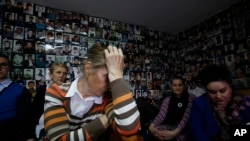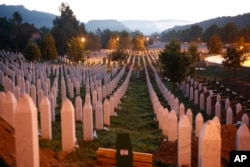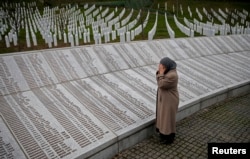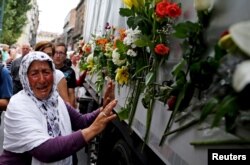Relatives of victims of the 1995 Srebrenica massacre told an appeals court on Thursday that the Dutch government should be held responsible for failing to protect more of the thousands of Bosnian Muslim men and boys killed there.
They are seeking to expand a 2014 ruling by a lower court that found the Netherlands culpable for the deaths of 300 of the 8,000 men and boys who were killed after leaving a United Nations compound that was run by Dutch peacekeeping troops.
"We think the state should be held liable for a much larger group because there were possibilities to save many more men," lawyer Marco Gerritsen, who represents the Mothers of Srebrenica group, told judges.
The earlier court decision found that the Dutch peacekeepers could have known that the men seeking refuge at the base in the village of Potocari would be murdered if forced to leave.
"In the knowledge that there was a serious risk of genocide men and boys were handed over (by the Dutch) to their killers, and they cooperated with the deportation of the women," said attorney Simon van der Sluijs, who also represents roughly 6,000 of the surviving Srebrenica relatives.
Gerritsen argued that the Dutch were also responsible for the safety of thousands of men who fled into the forests surrounding the Bosnian Muslim enclave - designated a "safe area" by the U.N. - to escape execution.
Lawyer for the Dutch state, Bert-Jan Houtzagers, said the lower court had been wrong to find that the Dutch battalion had "effective control" over the compound when it was overrun by Bosnian Serb forces.
"It was a chaotic situation where Bosnian Serbs called the shots and the only thing Dutchbat could do was to try and guide the situation to the best of their abilities," he said.
The Dutch forces did not foresee the later genocide and had been focused on "helping the refugees and guiding the evacuation," he said.
The failure of Dutch soldiers to protect the Muslim men and boys of Srebrenica has left a deep scar in Dutch politics, contributing to the resignation of the Dutch government in 2002.
The 1992-95 Bosnian war, in which at least 100,000 people were killed, was the bloodiest of a series of conflicts that accompanied the break-up of Yugoslavia in the 1990s.
On July 11, 1995, the enclave was overrun by the Bosnian Serb forces lead by commander Ratko Mladic, who is on trial for war crimes at an international court in The Hague.
A ruling was expected on March 14.








